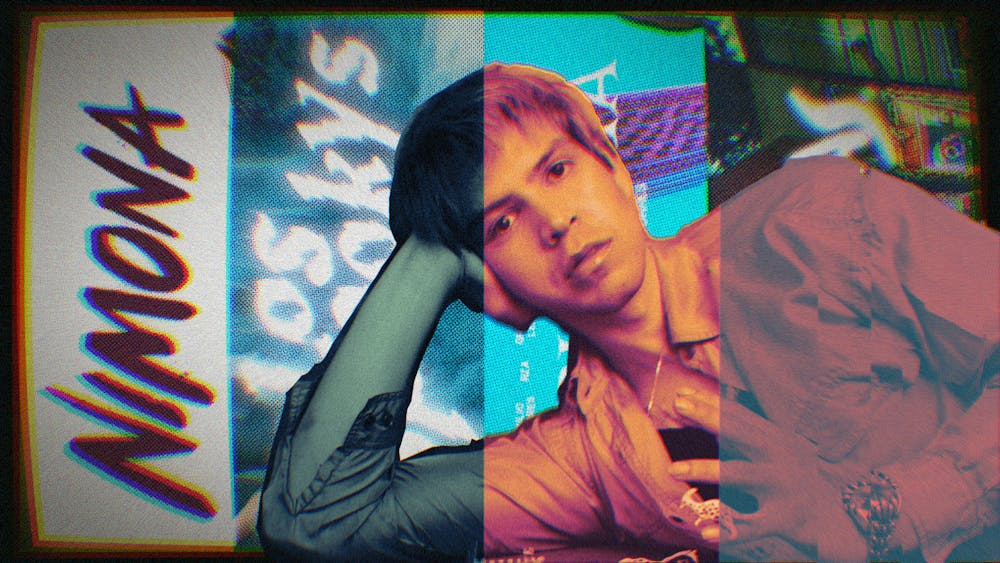Who else has spent post–midnight hours watching old Saturday Night Live clips instead of studying for that midterm you have in the morning? I bet you’ve watched “Wells for Boys” or “Papyrus”—two of the most viewed SNL sketches of all times. What if I told you they were both written by Julio Torres? Would you even know who that is?
Last summer, going into my first year at Penn, I spent about 50 percent of my time in movie theaters. Every single time I would see the trailer for Problemista, and I was entranced. Julio Torres had hooked me well and truly.
It hasn’t let up—this past summer, I was tuned into Torres’ new show, Fantasmas, which had a weekly release on Max. The show follows a fictionalized Julio on his quest to obtain a “Proof of Existence ID,” a document that acts similar to a social security number. It takes place in exaggerated and fantastical present–day New York, and its cast is just as over–the–top—Emma Stone, Julia Fox, Bowen Yang, Aidy Bryant, Natasha Lyonne—the list goes on and on.
When I think of popular comedy shows, I imagine sitcoms as something fast and punchy, with joke after joke. Fantasmas is not that. If you’re looking for a show to put on in the background while you simultaneously play Subway Surfers and work on your statistics homework, then I suggest something else (maybe a rewatch of The Office or Friends). Torres even pokes fun at these types of traditional sitcoms in Fantasmas: One running bit is a TV show called Melf that plays in the back of a ride–hailing car, in which the father of a traditional sitcom family falls in love with a puppet–alien–creature, “Melf.”
Fantasmas’ incoherent narrative adds to the feeling that a Julio Torres comedy is not your regular comedic fare. While there are recurring characters, the show feels as if it is a fever dream—a never–ending round of side quests while Torres searches for his lost gold oyster earring. It took me watching it two times to completely understand everything that happened. Emma Stone tries to escape from a crazed version of the Real Housewives, Aidy Bryant is a professional toilet decorator. It’s hard to coherently explain how these bits get worked into the overarching plot, even after a rewatch.
And yet, this show is one of my top recommendations to my friends. Even though I’m not shocked by the lack of mainstream knowledge about this show, I’m frequently disappointed about it. It is visually stunning, refreshingly fresh, and unlike anything I have ever seen. And above all, it is weird.
In watching Torres’ work, I sometimes need to step back and ask myself how someone could possibly come up with what he does—like his visual representation of the dark web, through a physical puppet in Problemista, or an ambassador who wants to fake her abduction to spend more time on vacation in Los Espookys.
Torres’ ideas may be wacky, but clearly they’re compelling. Why is it that so many A–list celebrities are willing to be on a show that was not raking in the big bucks and filmed in less than 32 days on a shoestring budget? Ultimately, it’s because of a mix of quality content, interesting form, and something to say. Torres offers us absurdist social commentary, even on mundane scenarios like customer service interactions.
Fantasmas often feels like a series of SNL bits that were cut for time because they were just a little too weird—which makes sense as Torres is an SNL alumnus. From looking at the cast of Fantasmas, you get the sense that there are many people who worked with him on SNL that love his creative mind and vision and just want to be a part of anything he creates. Even Los Espookys, his first show with Max, was co–created with Fred Armisen.
Torres’ work is more serious in tone than that of mainstream comedies. While many comedies can feel formulaic, Fantasmas is a show that embraces surrealist film styles that do not often find themselves worked into American TV. Watching the show feels like you’re looking at a painting, and engaging with it means experiencing quality social commentary made in ridiculous ways, like Torres spoofing on fame by making a sketch about exploiting his own identity through the media conglomerate Zappos.
More than anything though, Torres gives actors the chance to just be silly, to play a mermaid at the bottom of the ocean running a customer support line for lost items or a valet driver who only says the words “beep, beep.” When he gets more into the playful, comedic side of things, the serious elements of the show are not lost; they are simply presented in an absurdist way. These actors get to be in a more serious comedy, while still making something that feels important.
What the general public wants to see may not truly align with what creatives want to work on. Even things with critical acclaim, such as Hacks, often go unnoticed. For Torres’ projects, maybe the disconnect between creator and consumer comes from his weirdness, such as the lack of narrative structure in Fantasmas. So, I understand that it’s a hard sell. But it’s a pitch I’ll keep making.
Even though you may have never heard of him, everything Torres touches seems to attract your favorite celebrities. Maybe they’re onto something.

